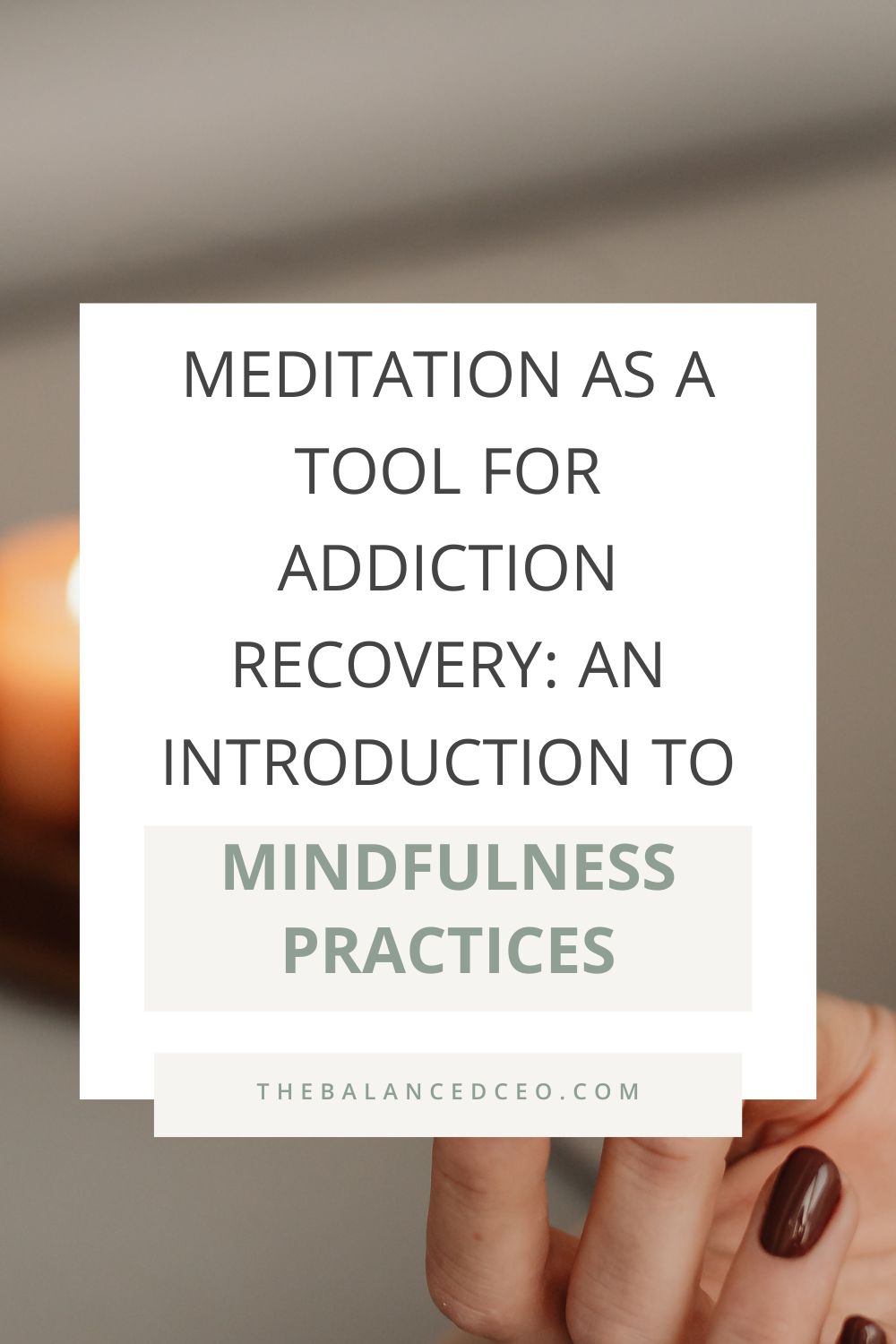This post may contain affiliate links, which means I’ll receive a commission if you purchase through my links, at no extra cost to you. Please read full disclosure for more information.

Addiction affects more than 21 million Americans. It ruins lives and communities. Given the challenges of addiction, we must explore every available option beyond conventional methods. One useful tool for gaining attention is meditation and mindfulness. New research shows it can retrain addicted brains, handle cravings, and enable genuine recovery.
How Meditation Helps Addicted Brains
Addiction lives in powerful brain pathways that drive compulsive behaviors regardless of harm. One area especially impacted is the amygdala – the emotional hub. Substances make it overactive, causing reactive urges and cravings.
The good part is the brain stays plastic – it can make new connections with the right help. Here’s where meditation enters. Studies using brain scans show regular mindfulness calms the amygdala and other addiction zones. Basically, it cools overworked pathways causing reactions and desires.
More proof supports the brain benefits. Look at the data below that shows the relapse rates in addiction recovery:

Data Source: American Psychological Association
This data shows that people with addictions who tried meditation were less likely to relapse than others. This signals improved self-control.
Mindfulness Tools for Beating Addiction
Many mindfulness techniques specifically assist in recovery:
1. Meditation
Quietly focusing on present thoughts, feelings, and senses builds self-awareness around triggers. This empowers people to pause before giving in to cravings.
2. Yoga
Yoga’s mind-body flowing movement is therapeutic. Studies reveal that it can significantly improve mood and alleviate anxiety and stress, which are common causes of relapse.
3. Deep Breathing
Maintaining focus on one’s breath soothes the body’s stress systems. This allows better emotional control in risky situations.
Research shows yoga and meditation can reduce cravings for those battling addiction. If you live in Cincinnati, searching for Cincinnati drug rehab can connect you with localized care providing training on these mindfulness tools.
Why Mindfulness Works
Aside from changing brains, mindfulness also:
1. Improves Self-Understanding – Observing the inner world non-judgmentally provides insight into destructive habits and triggers for better discipline. Around 72% in recovery report higher self-worth.
2. Teaches Healthy Feeling Management – Addiction often numbs difficult emotions. Meditation lets people process feelings in healthy ways again, dramatically cutting anxiety and depression.
3. Lowers Relapse Risk – Mindfulness directly chills craving pathways and gives motivation, focus, and lifestyle balance to avoid relapse long-term. Analyzed studies found over 55% fewer return to addiction with meditation.
4. Confronting Mindfulness Challenges in Recovery – Despite proven benefits, adopting mindfulness has common pitfalls without the right support:
5. Establishing Consistency – Ironically, while meditation enhances focus over time, 30% starting it in rehab quit within weeks unable to concentrate initially.
6. Accessing Encouraging Communities – Having like-minded connections normalizes struggles and keeps the motivation alive. But supportive groups aren’t accessible for all.
7. Finding Qualified Guidance – Learning mindfulness is significantly easier with experienced teachers. However, cost limits and misleading claims are frequent barriers.
Connect with verified teachers when possible, seek out alternative groups, use phone apps to build habits, and above all, be kind to yourself through ups and downs.
Ways Mindfulness Rebuilds Lives
Mindfulness practices change brains to beat addiction by diminishing cravings and reactivity over time with consistency. But meditation’s benefits stretch much further by actively restoring dimensions of well-being once damaged by substance abuse. Here are 3 areas that dramatically improve through mindfulness work.
1. Reviving Relationships
Addiction often harms ties with even the closest loved ones through repeated lies, lack of presence, unpredictable behaviors, financial strains, and violence. The harm can feel irreparable. Mindfulness helps by:
- Building self-awareness to recognize relationship damage caused by active addiction
- Reducing impulsive reactions to nurture healthier communication
- Enabling emotional availability to mend bonds through presence and empathy
This emotional rewiring combined with concrete commitments to consistent positive behaviors often slowly restores broken trust. While time and work lie ahead, mindfulness plants seeds of hope. Many people struggling with addiction cite mended family ties as their greatest mindfulness achievement.
2. Career Growth
The major population of individuals with substance addictions is unemployed. Financial and work world ruins often seem impossible to overcome. Yet here too, meditation facilitates rebirth by:
- Boosting ability to cope with high-stress job triggers without destructive outlets
- Strengthening skills like concentration needed to thrive in roles
- Allowing envisioning new professional purpose and potential
Recent studies reveal over 40% of those in recovery mindfulness programs acquire full-time work within a year – a strong promise for rebuilding dreams.
3. Ongoing Sobriety Support
While meditation yields neurological and psychological changes early on, sustaining growth requires ongoing community ties, lifestyle balance, and professional care for lasting transformation. For continued success, recovering individuals should:
- Attend meditation gatherings weekly for motivation and perspective
- Seek trauma-based therapy addressing the root causes underlying addiction
- Volunteer with recovery organizations to help others dealing with similar struggles
By continually investing through multidimensional healing avenues, people cement mindfulness benefits for thriving sober living year after year. Relapse becomes less likely as joy and purpose fill voids once occupying addiction.
The Promise Ahead
Healing addiction’s complicated roots require comprehensive, dedicated efforts on physiological, emotional, social, and spiritual fronts simultaneously. Mindfulness alone cannot remove all barriers but it empowers internal and external changes unlike any other modality – it illuminates the path forward. Committing to the mindfulness journey for addiction, though initially challenging, offers incredible promise in reshaping one’s life trajectory beyond the struggle, towards horizons once unimaginable.
Frequently Asked Questions
1. How exactly does meditation change addicted brains?
Studies show mindfulness practices calm areas like the amygdala and literally alter pathways to reduce reactivity and desires over time.
2. Can mindfulness meditation assist anyone battling addiction?
Research confirms mindfulness techniques work across alcohol and drug addiction treatments, with similar success rates for voluntary and mandated individuals if practiced consistently.
3. How quickly can mindfulness start preventing relapse?
While timing differs per person and addiction, some brain and behavior improvements emerge in as little as 2-3 weeks showing relatively fast benefits if maintained.
Conclusion
Addiction’s damage necessitates every recovery option imaginable. Mindfulness provides hopeful new inroads where others fall short. Psychological plus neurological evidence supporting meditation for better addiction outcomes is compelling and expanding. Most importantly, committing to tools that cultivate steadiness of body and mind extends benefits to all wellness dimensions – not just ending addiction but enabling flourishing for life.
Ongoing research supports mindfulness practices as effective complementary treatments in addiction programs. They help in calming addictive brain patterns, managing desires and emotions, extending addiction remission, and nurturing pathways for long-term health.

Daniel Martin
Guest Blogger
Daniel Martin is a digital marketing professional with years of experience in the industry. He has a proven track record in building high-performance teams that produce engaging content enjoyed by millions of users. Dani’s unique combination of creative and innovative thinking has helped him solve complex challenges for clients in a wide range of industries. When he’s not working, he enjoys photography and playing the carrom board.





Leave a Reply